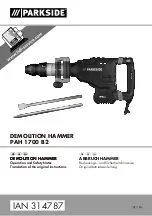
34
Remote Commands
RS232/USB Remote Command Format
Serial input to the instrument is buffered in a 256 byte input queue which is filled, under interrupt,
in a manner transparent to all other instrument operations. The instrument will send XOFF when
approximately 200 characters are in the queue. XON will be sent when approximately 100 free
spaces become available in the queue after XOFF was sent. This queue contains raw (un-
parsed) data which is taken, by the parser, as required. Commands (and queries) are executed in
order and the parser will not start a new command until any previous command or query is
complete. In RS232 mode responses to commands or queries are sent immediately; there is no
output queue.
USB input conforms with USB 2.0 Full Speed.
LAN input to the instrument is buffered in a 1500 byte input queue which is filled, under interrupt,
in a manner transparent to all other instrument operations. LAN interface conforms with 1.4 LXI (
LAN eXtensions for Instrumentation) Core 2011.
Commands must be sent as specified in the commands list and must be terminated with the
command terminator code 0AH (Line Feed, LF). Commands may be sent in groups with
individual commands separated from each other by the code 3BH (;). The group must be
terminated with command terminator 0AH (Line Feed, LF).
Responses from the instrument to the controller are sent as specified in the commands list. Each
response is terminated by 0DH (Carriage Return, CR) followed by 0AH (Line Feed, LF).
<WHITE SPACE>
is defined as character codes 00H to 20H inclusive.
<WHITE SPACE>
is ignored except in command identifiers. e.g. '*C LS' is not equivalent to '*CLS'.
The high bit of all characters is ignored.
The commands are case insensitive.
GPIB Remote Command Formats
GPIB input to the instrument is buffered in a 256 byte input queue which is filled, under interrupt,
in a manner transparent to all other instrument operations. The queue contains raw (un-parsed)
data which is taken, by the parser, as required. Commands (and queries) are executed in order
and the parser will not start a new command until any previous command or query is complete.
There is no output queue which means that the response formatter will wait, indefinitely if
necessary, until the instrument is addressed to talk and the complete response message has
been sent, before the parser is allowed to start the next command in the input queue.
Commands are sent as
<PROGRAM MESSAGES>
by the controller, each message consisting of zero
or more
<PROGRAM MESSAGE UNIT>
elements separated by
<PROGRAM MESSAGE UNIT SEPARATOR>
elements.
A
<PROGRAM MESSAGE UNIT>
is any of the commands in the remote commands list.
A
<PROGRAM MESSAGE UNIT SEPARATOR>
is the semi-colon character ';' (3BH).
<PROGRAM MESSAGES>
are separated by
<PROGRAM MESSAGE TERMINATOR>
elements which may
be any of the following:
NL
The new line character (0AH)
NL^END
The new line character with the END message
^END
The END message with the last character of the message
Responses from the instrument to the controller are sent as
<RESPONSE MESSAGES>
. A
<RESPONSE MESSAGE>
consists of one
<RESPONSE MESSAGE UNIT>
followed by a
<RESPONSE
MESSAGE TERMINATOR>
.
A
<RESPONSE MESSAGE TERMINATOR>
is the new line character with the END message NL^END.
Each query produces a specific
<RESPONSE MESSAGE>
which is listed along with the command in
the remote commands list.








































